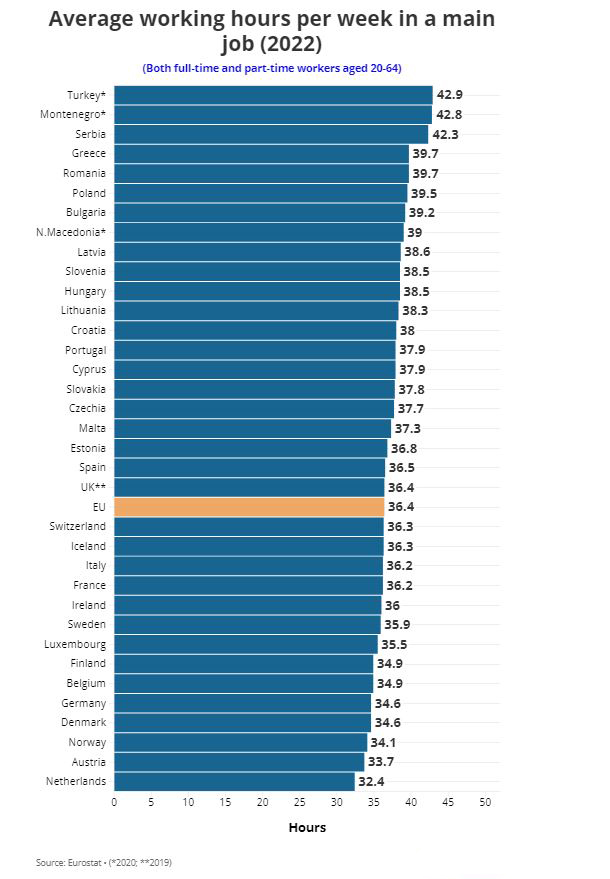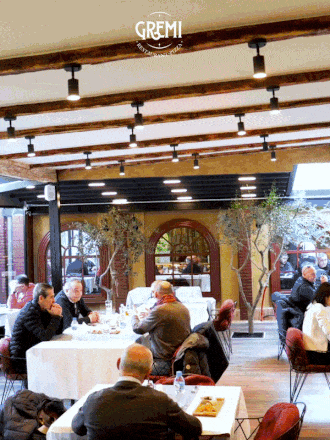Officially, as of today Gremi Clinic employees will work only 32 hours a week.
This is the latest decision by Dritan Gremi, CEO of Gremi Group and one of the country’s leading companies in terms of employees’ rights, wages and working hours.
“It’s a record, we are the first in Europe for the shortest working hours,” says Dritan Gremi, referring to the fact that according to Eurostat data the country with the shortest working hours is the Netherlands with 32.4 hours per week, while on Average, Turkey ranks as the country with the most working hours per week, accounting for 42.9.
Would you like to make your staff happier and more productive? Empower them with fewer working hours.”
This is how Claire Hall, head of human resources, titled an article in “The Guardian,” while for Dritan Gremi this decision came after consultation with employee groups. In his view of employee relations, he believes that fewer working hours will make the staff more efficient and productive, and at the same time encourage young people, who, treated with integrity, will not leave the country, but build their future here.
Of course, this also provides an opportunity for employees to have more time for themselves, their people and families, but also to qualify further, to read or study if they so wish.
The entrepreneur points out that this step comes after another test 3 years ago, when working hours were reduced from 40 to 35 per week, making Gremi Group the only company in Albania with these standards and leaving behind other countries in Europe.
“This move did not reduce the incomes, consolidating staff stability. After 3 years, we are attempting another challenge by breaking another record, this time a European one and actually becoming the company where we work the fewest hours per week in Europe. This is an achievement that fills me with satisfaction and makes me proud of myself and the people who work with me,” says Dritan Gremi.
Speaking in “Myalbania” about this initiative, Gremi says that it would be an excellent opportunity for this step to be taken by other companies, as according to him, entrepreneurship is a mission that connects the entrepreneur not only with his personal interests, but also with those of the employees and, of course, the whole society.
Following the same logic, Dritan Gremi believes that Albanian entrepreneurs have the opportunities and skills to stop the flow of emigration with their contribution to improving working conditions and raising wages, and why not make people happy.
On the other hand, he says that for this to happen in a massive and balanced way, formalization of the economy and tax system is necessary.
“If I were to apply low-cost prices to dental services, I would not be able to implement this reduction in working hours. It is a standard that requires a regulated market, where free competition works and where fees and revenues are declared in the system without setting low-cost prices, secured through tax evasion or dental materials being smuggled in,” Gremi says.
Speaking of the standards that must be applied, he says that charging low prices or evading taxes, as many dental tourism operators do, not only distorts the labor market with low payments, but also reduces the quality of the service and simultaneously creates a category of dissatisfied workers who in the first case would find the solution by emigrating. On the other hand, this behavior greatly harms and damages the “made in Albania” brand by labeling us to foreigners as a low-cost country with poor service quality.
It is time for entrepreneurs and businesses to move toward a quality product that guarantees income, good labor standards for employees, stability and a stable employer-employee relationship.
It is time for the state and society as a whole to see as “smoke burning their eyes” any enterprise that operates at low prices, navigating the mire of tax evasion and desecrating the value of the “Made in Albania” brand identified as “low cost.”
Even worse, when one remembers the “deadly” consequences that all these behaviors have in society. The state absolutely must encourage and stimulate those businesses that create values, norms, rights and welfare in society, as a social responsibility that in fact belongs to it.



